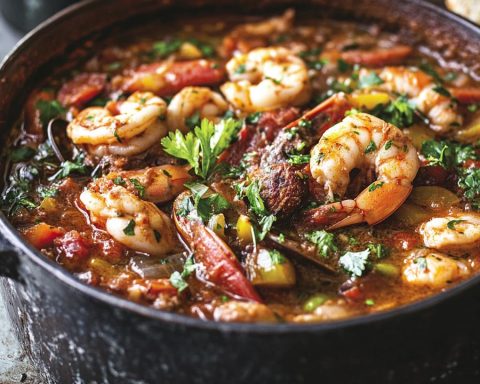“`html
“`
In the serene town of Nantua, nestled within the lush landscape of eastern France, a sauce was born that would carry the region’s culinary legacy to distant lands. Molho Nantua combines the delicate flavor of crayfish with the creamy richness of a traditional béchamel sauce. The dish captures the spirit of French elegance and transforms it into a sauce that elevates any seafood or shellfish dish. The creamy, buttery sauce is sought for its indulgent savoriness and is renowned for making any dinner feel like a special occasion. This recipe, containing around 300 calories per serving, is perfect for intimate dinner parties or celebratory meals when you wish to impress your guests with a touch of sophistication.
Ingredients
– 250g raw crayfish
– 30g butter
– 20g all-purpose flour
– 500ml milk
– 50ml dry white wine
– 1 shallot, finely chopped
– 1 tbsp tomato paste
– Salt and white pepper, to taste
– 1 tbsp fresh parsley, chopped
Instructions
1. Prepare the Crayfish
– Begin by bringing a pot of salted water to a boil and blanch the crayfish for about 3 minutes until they turn bright red. This will make them easier to peel and enhance their flavor.
– Remove the crayfish from the pot and let them cool. Peel off the shells, ensuring you reserve the flesh and set it aside.
2. Crayfish Stock
– Crush the crayfish shells slightly to let out their flavors, and place them back in the pot.
– Add 300ml of water and simmer the shells for about 15 minutes to create a flavorful stock. Strain the stock and set it aside.
3. Create the Sauce Base
– In a large skillet, melt the 30g of butter over medium heat. Once melted, add the chopped shallot and sauté until soft and translucent.
– Stir in 20g of flour to form a roux, cooking gently for about 2 minutes to remove the raw flour taste.
4. Enrich the Sauce
– Gradually add the 500ml of milk to the skillet, stirring constantly to prevent lumps from forming. As the mixture thickens, slowly incorporate the crayfish stock and 50ml of dry white wine.
– Stir in 1 tablespoon of tomato paste, and season generously with salt and white pepper.
5. Incorporate the Crayfish
– Chop the crayfish meat into small, bite-sized pieces and add them to the sauce.
– Let the sauce simmer gently for another 10 minutes until it reaches a creamy consistency and the crayfish are warmed through.
6. Final Touches
– Sprinkle with 1 tablespoon of fresh parsley just before serving to add a burst of color and freshness.
Cooking Tips:
– For a richer flavor, consider including a bit of cream in your sauce.
– If fresh crayfish are unavailable, pre-cooked or frozen alternatives can be used.
Serving Suggestions:
Molho Nantua pairs beautifully with seafood like shrimp or scallops, and can also complement pasta or rice dishes, turning them into a gourmet delight. For a classic touch, you can use it as a sauce over a delicate fish filet, accompanied by a chilled glass of Chardonnay to balance the richness of the dish.
With these steps, you can bring the legacy of French cuisine into your home, creating a memorable dish that impresses with its elegance and authenticity.
Unveiling the Secrets of Molho Nantua: Elevate Your Culinary Skills with This Classic French Sauce
Introduction
Nantua, a quaint town nestled in eastern France, is renowned not just for its picturesque landscapes but for a rich culinary tradition embodied in Molho Nantua. This luxurious sauce masterfully combines the delicate flavors of crayfish and the creamy allure of béchamel, making it an ideal accompaniment to various seafood dishes. Known for its elegant charm, the sauce transforms simple dining into a memorable gourmet experience. With approximately 300 calories per serving, it’s both indulgent and sophisticated, perfect for intimate gatherings or special occasions.
Cooking Techniques
Perfecting Molho Nantua requires a blend of precise cooking techniques, enhancing the flavors and textures for which French cuisine is celebrated:
– Blanching: Swiftly boiling the crayfish before cooling them helps in peeling and enhances the flavor. This crucial step ensures the flesh remains tender and juicy.
– Roux Preparation: Forming a roux by sautéing shallots and stirring in flour to remove its raw taste helps in achieving the creamy texture characteristic of béchamel sauces.
– Layered Flavoring: Incorporating crayfish stock and dry white wine into milk-based sauce elevates its complexity, while tomato paste adds depth and color.
Ingredient Substitutions
While the recipe traditionally calls for fresh crayfish, you can adopt these substitutions without losing authenticity:
– Crayfish: Opt for pre-cooked or frozen crayfish if fresh is unavailable. Lobster can also be a luxurious alternative for a different flavor profile.
– White Wine: A dry Vermouth can substitute for an added dimension in taste.
Pairing Suggestions
Molho Nantua complements a wide array of dishes, offering flexibility in gourmet dining:
– Seafood Pairings: Aside from crayfish, dishes featuring shrimp or scallops beautifully harmonize with the sauce. Pour over grilled or poached fish for a classic touch.
– Accompaniments: Serve alongside fresh pasta or rice to transform simple meals into exquisite culinary experiences. A chilled Chardonnay provides a perfect balance, cutting through the sauce’s richness.
Pros and Cons
Pros:
– Sophisticated Flavor: Transforms ordinary seafood into a gourmet delicacy.
– Versatile Pairings: Complements a broad range of dishes, enhancing flavor profiles.
Cons:
– Preparation Time: Requires several steps and attention to detail.
– High Caloric Content: About 300 calories per serving, which might not suit all dietary plans.
Common Mistakes
Avoid these pitfalls to ensure the perfect Molho Nantua every time:
– Overcooking the Crayfish: Leads to tough, rubbery meat. Stick to blanching time recommendations.
– Lumpy Sauce: Pour milk gradually and stir continuously to avoid lumps in the sauce.
Storage Tips
For later use, store Molho Nantua in an airtight container in the refrigerator for up to 3 days. Reheat gently on the stove, adding a splash of milk to restore its original creamy consistency.
Conclusion
Molho Nantua is not just a sauce; it’s an art form that encapsulates the elegance and tradition of French cooking. By mastering its preparation, you can impress guests and elevate any meal to the status of haute cuisine. With recommended pairings, substitutes, and techniques, this guide serves as your gateway to crafting authentic Molho Nantua in your kitchen.
For more on French culinary arts and exquisite recipes, explore Epicurious for inspiration and expert tips.








